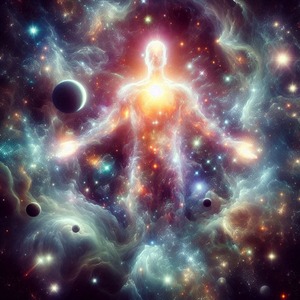Introduction
What is God? Is God real? Is God he, she, or it?
Let’s move on to today’s topic, which is both interesting and mysterious. People have been searching for answers to the question “What is God?” for centuries, and many have given different explanations.
Religious Perspectives on God
Monotheistic Religions
In some religions, God is considered a singular masculine power who created the universe. This God possesses human qualities like love, compassion, and anger, and gives us results according to our karma. He is the only supreme power, the supreme being, and the source of all power.
In Christianity, God is often depicted as a Trinity—Father, Son (Jesus Christ), and Holy Spirit. This triune nature emphasizes the unity and diversity within God’s essence. Christians believe God is both immanent (present within the world) and transcendent (existing beyond the physical realm).
Islam portrays God (Allah) as the sole creator and sustainer of the universe. The Quran, Islam’s holy book, describes Allah as merciful, compassionate, and just. Allah’s attributes are detailed in the 99 Names of God, each reflecting a different aspect of His nature.
In Judaism, God (Yahweh) is the singular, eternal creator of all that exists. The Hebrew Bible (Tanakh) outlines God’s covenant with the Jewish people and His laws for living a righteous life. God’s nature is depicted as both loving and just, guiding His people through history.
Polytheistic Religions
Polytheistic religions, such as Hinduism, ancient Greek religion, and Shinto, believe in multiple gods and goddesses, each with distinct roles and attributes. Hinduism, for instance, encompasses a vast pantheon of deities, with Brahman being the ultimate, formless reality. The trinity of Brahma (the creator), Vishnu (the preserver), and Shiva (the destroyer) represents different aspects of the cosmic functions.
Ancient Greek religion featured gods like Zeus, Hera, Poseidon, and Athena, each governing different aspects of life and nature. These deities were often anthropomorphic, embodying human traits and emotions, which made them relatable to followers.
Shinto, the indigenous spirituality of Japan, reveres kami—spiritual beings or gods associated with natural elements, ancestors, and various aspects of life. Kami are not omnipotent but are integral to the harmony and balance of the world.
Philosophical Perspectives on God
Philosophical interpretations of God often diverge from traditional religious views, exploring the nature of divinity through reason and metaphysics.
Deism
Deism posits that God created the universe but does not intervene in its affairs. Deists believe that reason and observation of the natural world are sufficient to understand the existence of a creator. This view emerged during the Enlightenment, emphasizing a rational approach to spirituality without reliance on religious dogma or supernatural events.
Pantheism
Pantheism equates God with the universe and all its phenomena. In this view, God is not a separate, personal being but the sum of all existence. This perspective can be found in various spiritual traditions, including some interpretations of Hinduism and Taoism. Pantheism encourages a sense of unity with the cosmos and an appreciation for the interconnectedness of all life.
Panentheism
Panentheism holds that God is both immanent in the world and transcends it. This view suggests that the universe is contained within God, but God is more than the universe. Panentheism seeks to reconcile the immanence of pantheism with the transcendence of traditional theism, offering a more dynamic and relational understanding of divinity.
Modern Perspectives on God
Contemporary discussions about God often incorporate scientific insights, psychological theories, and personal spirituality.
The God of the Gaps
Some modern thinkers argue that God serves as an explanation for phenomena not yet understood by science—a concept known as the “God of the Gaps.” As scientific knowledge expands, the gaps for which God is the default explanation shrink. Critics of this view suggest that it reduces God to a placeholder for ignorance, rather than a fundamental aspect of reality.
Process Theology
Process theology, influenced by the work of philosophers like Alfred North Whitehead, envisions God as evolving with the universe. According to this view, God is not static but dynamically interacts with creation, experiencing growth and change. This perspective aligns with modern understandings of an ever-evolving cosmos and emphasizes a relational and responsive deity.
Psychological and Symbolic Interpretations
Psychological perspectives, such as those proposed by Carl Jung, interpret God as an archetype within the human psyche. Jung viewed religious experiences and symbols as expressions of deep, unconscious processes that shape individual and collective consciousness. From this standpoint, God represents the human quest for meaning, wholeness, and connection with the transcendent.
Personal Spirituality and the Search for God
In addition to organized religion and philosophical inquiry, many people explore the concept of God through personal spirituality. This journey often involves seeking a direct, experiential connection with the divine, which can be expressed through meditation, prayer, nature, art, and other forms of personal expression.
Personal spirituality allows for a flexible and individualized understanding of God, free from institutional constraints. It acknowledges that the experience of the divine is deeply personal and can vary widely from one person to another. This approach emphasizes inner growth, self-discovery, and the cultivation of a meaningful relationship with the sacred.
Personal View
The question “What is God?” elicits a multitude of answers, reflecting the diverse ways humans have sought to understand the divine. From the monotheistic traditions that portray God as a singular, personal being, to the philosophical perspectives that see God as an abstract principle, the concept of God encompasses a rich tapestry of beliefs and ideas.
Modern perspectives continue to evolve, integrating scientific insights and psychological theories into the discourse. Ultimately, the search for God is a deeply personal and ongoing journey, inviting individuals to explore the mysteries of existence and the profound questions of life. Whether through religious faith, philosophical reflection, or personal spirituality, the quest to understand God remains a central and enduring aspect of the human experience.
Let’s understand this with an example. There are some people who find happiness in serving others or in helping and protecting the living beings in the universe. So, for them, that is God. Or we can also understand it as a gold ornament; it can only be a gold ornament when there is gold. Or ice; ice can only be there when there is water. Ice cannot be there without water. So that’s why the universe can only be there when there is God. God is the universe.
Let me give you another example. I made an idol of clay and dressed it in very nice clothes made of clay. I made its ornaments out of clay, which the idol is wearing. That idol has a lot of flowers in its hands. There is a bucket of water or anything else, which I made out of clay and held it. And I colored it or didn’t even color it.
When we look at the idol, or when a small child looks at it, they see a statue and are happy, saying, “Wow! What a beautiful statue, wearing beautiful clothes and beautiful jewelry, and look at the lovely flowers.” But if an adult or a wise person comes, they will see that it’s all made of clay. They will explain to the child, “Everything you see—the jewelry, clothes, flowers, bucket of water—appears different but is actually made of the same material, clay.”
In the same way, everything in this universe appears different but is actually made from God. As we have learned from childhood, “kan kan mein bhagwan hai,” which means “God is in every particle.” The truth is that every particle is God. Understanding this truth is essential.


